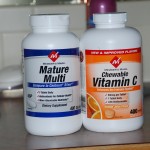I've written several posts on calcium intake and, in reviewing them for the book I'm working on, noted I had mentioned, but not detailed, my thoughts about vitamin D. So I've been researching source material on the subject and wanted to bring you up to date on my take on the new recommendations for how much we should be getting.
Let's begin with vitamins in general. A reasonable starting definition of a vitamin is an organic compound that is required in tiny amounts and can't be synthesized by the body. So until the 1930s, when vitamin C was first made by chemical means, all our vitamins came from our diet.
Vitamins are divided into water-soluble and fat-soluble varieties. The former include vitamin C and the B vitamins, B1, 2, 3, 5, 6, 7, 9, and 12; the latter include vitamins A, D, E and K. Various others have been proposed and later found to be capable of synthesis by humans, thus accounting for the missing letters and numbers.
Water-soluble vitamins are not well-stored by the body and must be regularly replenished. Vitamin C, for instance, in studies conducted on conscientious objectors in Britain during WW II and in Iowa on prisoners in the 1960s, is depleted in a few weeks to as long as six to eight months depending on the degree of "pre-loading". The British Navy started giving lime juice to its sailors in 1795 to prevent them from developing scurvy on long voyages.
On the other hand excess intake of these is less likely to have toxic effects.
Fat-soluble vitamins are stored in the liver and various fatty tissues, need not to be taken quite as regularly and conversely are more likely to be toxic when taken in excess.
Those are, of course, sweeping general statements.
So let's go back to how we get our vitamins and a few controversies. The famous chemist and two-time Nobel pre winner Linus Pauling, proposed in 1970 that taking larger doses of vitamin C could reduce the incidence of the common cold. He later expanded his claims to include mega-dose vitamin C as beneficial for a variety of ailments, including cancer.
A large series of well-designed and double-blind studies disproved the former claim and the Mayo Clinic conducted three controlled studies from 1979 to 1985 that showed patients with advanced cancer who were given 10,000 milligrams of vitamin C a day had no improvement when compared to pateints given a placebo.
So we take 500 milligrams of vitamin C a day. Can you get enough of the 13 vitamins from your diet? Sure if you work at it. Does the requirement for various vitamins change with age? I think the answer if clearly yes and, for instance, we're now taking a large dose of B12 daily as recent data suggests seniors may malabsorb this crucial vitamin.
And B12 is water soluble, so if I take a little bit more than I need I'm not going to worry about it.
But then there are the fat-soluble vitamins and I'll write more about them and especially about vitamin D in my next post.


My husband and I take 500 mg of Vitamin C daily in addition to our multi-vitamin. But mega-doses? Not for me. I even think vitamins should be taken in moderation.